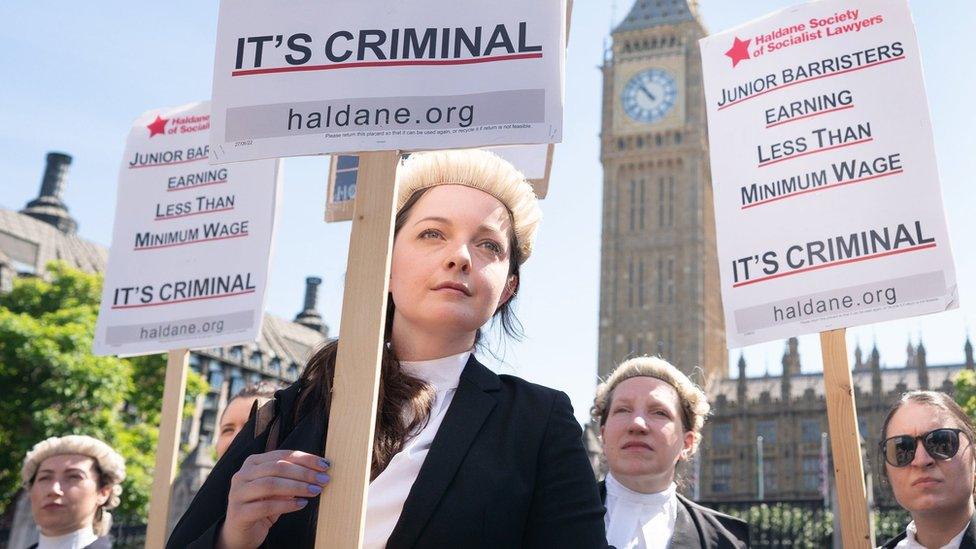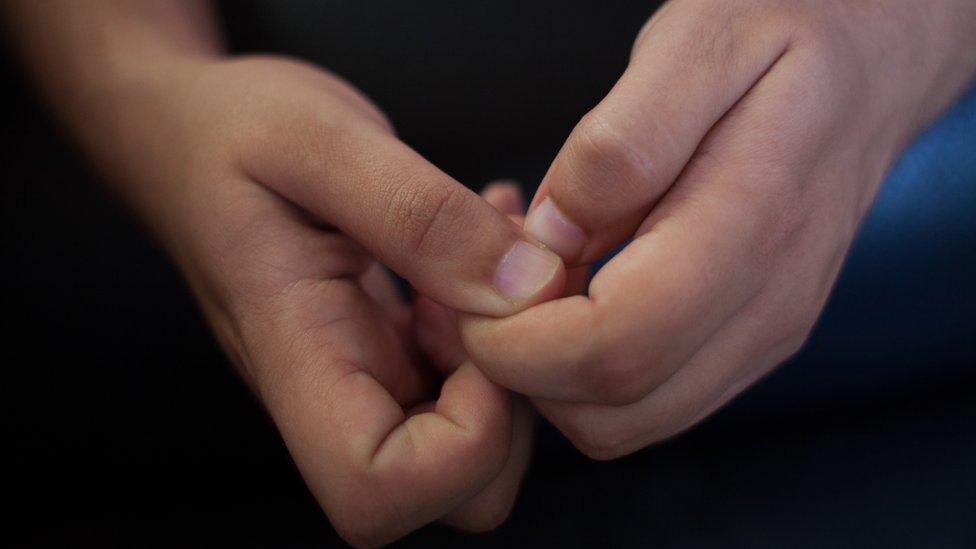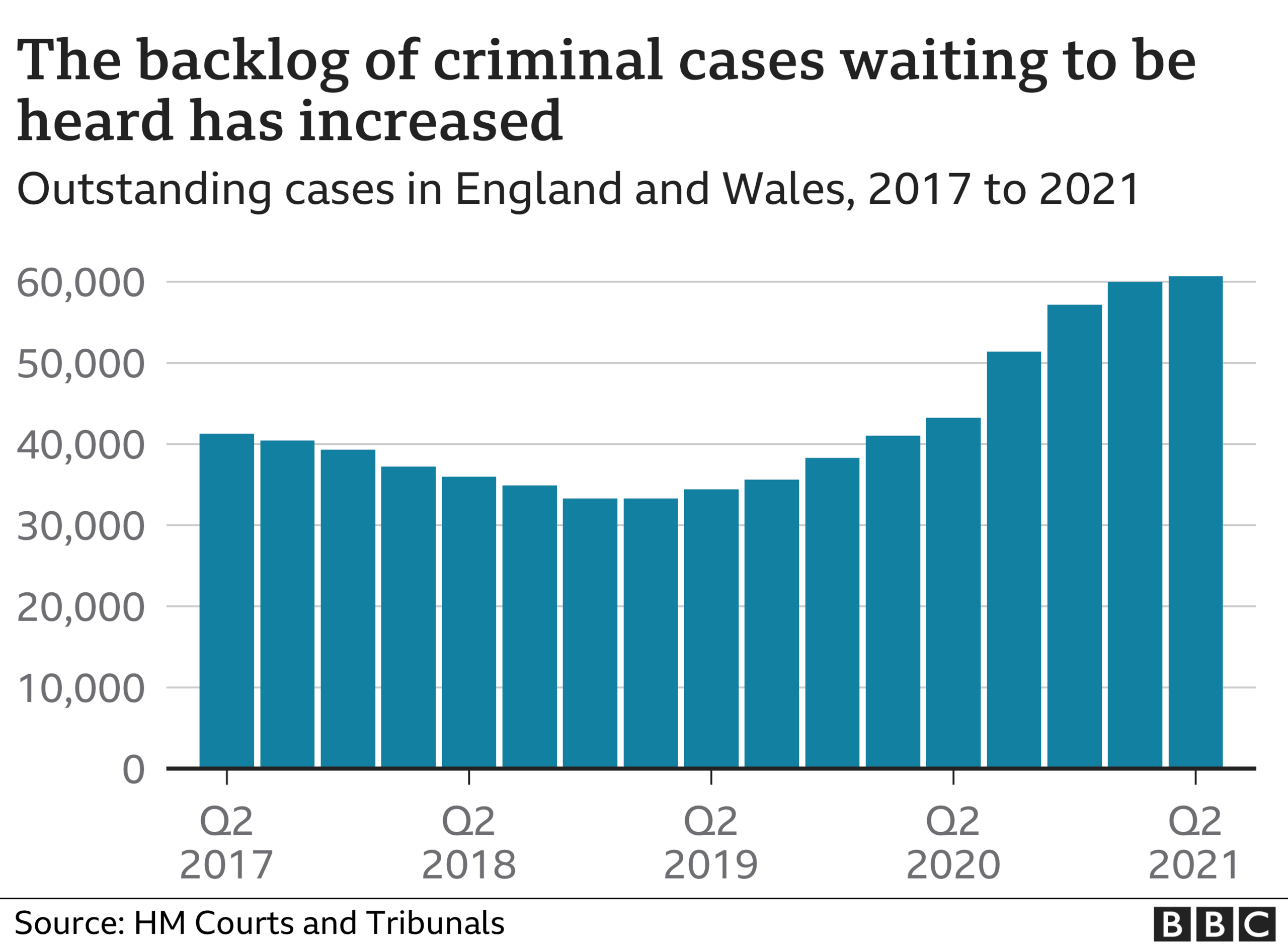Barristers' strike: Crime victims in despair as court delays worsen
- Published

The father of a sex-assault victim is backing barristers' strike action, even though it could add to the court delays that drove his son to attempt suicide.
The fourth week of the action, over pay, will last for five days, adding to trial delays in England and Wales.
The government says the strikes are exacerbating court backlogs, but the lawyers say the criminal-justice system has been grinding to a halt for years.
Despite the prospect of further delays, the father says he supports their case.
The Ministry of Justice says the courts backlog rose during the pandemic but it is making progress in tackling it.
And it says the barristers' strike is hampering that progress.
But "James", father of a teenage victim in a sexual-assault case, says the family, from near Manchester, have suffered delays at every stage - long before the barristers' action - and his son has twice attempted suicide, causing them to lose faith in the system.
After a three-year wait, James says the trial was finally scheduled for two weeks ago but then suddenly postponed until March.
He blames disarray in the criminal-justice system, compounded by the strike, for leaving his son in limbo for so long.
Yet he has sympathy for the barristers. "I completely agree with what they're doing but it's put us in quite a position," he says.
The barristers have rejected the government's offer of a 15% rise in the fees for legal-aid work, saying they need 25% to make up for a decade of underfunding.
On Monday the Criminal Bar Association (CBA) have held rallies in Manchester, Birmingham and Winchester, plus a lobby of Parliament.
The trials delayed include two murder cases, scheduled to start on Monday at the Old Bailey.
Barristers will continue to hold week-long strikes, every other week from August - and courts will be further disrupted when security staff walk out over pay on 29 July and 2,3 and 4 August.
'Worst nightmare'
James's son, "Joe", was 13 when he revealed he had been sexually assaulted a number of times.
James, who asked the BBC not use their real names, describes the discovery as "horrifying", his "worst nightmare".
The family had high hopes that the full hearing, expected to last five days, would bring them closure and allow them to rebuild their lives.
But at the last minute, James was told an earlier trial had overrun, so Joe's case was delayed, moved to another court and then postponed until next March.

"This court system is a sinking ship," says James. "And when the lifeboats are thrown out, the first we put on are the women and the children.
"So why is it that my child is not looked at by the courts in the same way?"
Joe is now nearly 17 and, says his dad, "should be out with his friends, looking forward to university".
Instead, he says: "He's gone inward on himself, keeps himself in his room...
"He's got himself hyped up to thinking, 'I'm gonna find out, whichever way, win lose or draw, this trial goes.'
"You know, that little light at the end of the tunnel has well and truly been snuffed out, yet again."

Diana Fawcett, chief executive of the Victim Support charity said: "We hear every day from people facing excruciatingly long waits for trial, and many of the victims we're supporting have been affected by the strikes.
"However, when it comes to backlogs in our courts these strikes are only part of the picture and long court delays have been an issue for nearly a decade.
"The government needs to take urgent action and invest across the whole system to tackle far-reaching problems, ensure justice is done and to stop victims from losing faith in the criminal-justice system altogether."
Jo Sidhu, who chairs the CBA said: "If we haemorrhage specialist criminal barristers, who provide prosecutors, defence advocates and judges, then victims of crime take the added pain of more months to their trial dates."
A Ministry of Justice official said: "Outstanding cases in the crown court fell to a record low in 2019 but the pandemic caused severe delays.
"We are making progress in tackling the backlog with the crown court caseload down by over 2,000 and the magistrates' court caseload a fifth lower than the peak last summer.
"The current strike is now forcing victims to wait for justice, despite a generous £7,000 pay rise for the typical criminal barrister coming in September. We encourage barristers to put victims first and prevent any further delays."